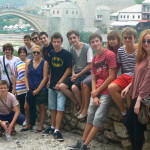Inter-ethnic Reconciliation in Bosnia: Mladic’s arrest is just the beginning

A street vendor shows a Serbian newspaper with the headlines about Ratko Mladić's arrest. (Alexa Stankovic/AFP/Getty Images)
Last week’s arrest of Bosnian Serb General Ratko Mladic and his ongoing trial on charges of genocide and crimes against humanity seems like a good opportunity to bring closure to the victims of the 1992-1995 Bosnian War. However, according to a recent Reuters article, while Mladic’s trial may expose the truth about the war in Bosnia, reconciliation of the country’s divided people is still a long way off.
The US-sponsored Dayton Peace Accords of 1995 ended the war, dividing Bosnia into two autonomous entities, a Bosniak-Croat federation, known as the Federation of Bosnia and Herzegovina and a Serb Republic, known as Republika Srpska. However, the accord did nothing to repair ethnic divisions which have widened over the years, with Bosnian Serb separatism on the rise.
Survivors and victims of the conflict expect justice but they are skeptical that the truth will be the same for everyone. Mirsad Duratovic, head of the association of wartime detainees in the northwestern town of Prejidor, says, “To us, who have been tortured in Serb detention camps and lost family members, Mladic’s trial does not mean a lot. Nothing will change in Serb minds nor will they be ready to face the truth about the war here.”
While the arrest is a significant step, by itself it will not be enough to bring about reconciliation in Bosnia. The work of achieving inter-ethnic cooperation will need to continue on the ground. An example of these efforts is a universal code for protection of holy sites jointly implemented by Search for Common Ground, the Oslo Center, Religions for Peace, and One World in Dialogue. We are conducting a pilot project aiming to transform the vision of the code into concrete steps.
Attacks on religious and ethnic minorities and their holy places occur throughout Bosnia, as all three ethnic groups are a minority in various areas of the country. Such attacks or incidents can include acts of vandalism, arson, burglaries, harassment, desecration of grave sites, obstruction regarding the rebuilding of destroyed religious shrines—and in some cases—even killings. The project aims to prevent such attacks by establishing monitoring bodies comprising representatives of religious communities, public authorities and other public bodies to oversee the implementation of the code on local, regional or national levels. Additionally, the Inter-religious Council (IRC) in Bosnia will promote an immediate multi-religious response condemning attacks on holy sites. For instance if a mosque is attacked in Republika Srpska, the secretariat of the IRC will conduct a visit to the affected site and facilitate a multi-religious condemnation on the spot, by the local imam and priest to the media representatives present. Such joint statements will build trust and improve communication amongst religious communities’ representatives in the local community.
This project and others like it will help to promote ethnic and religious cooperation in Bosnia, and may, in time, help to heal the wounds of the conflict.








